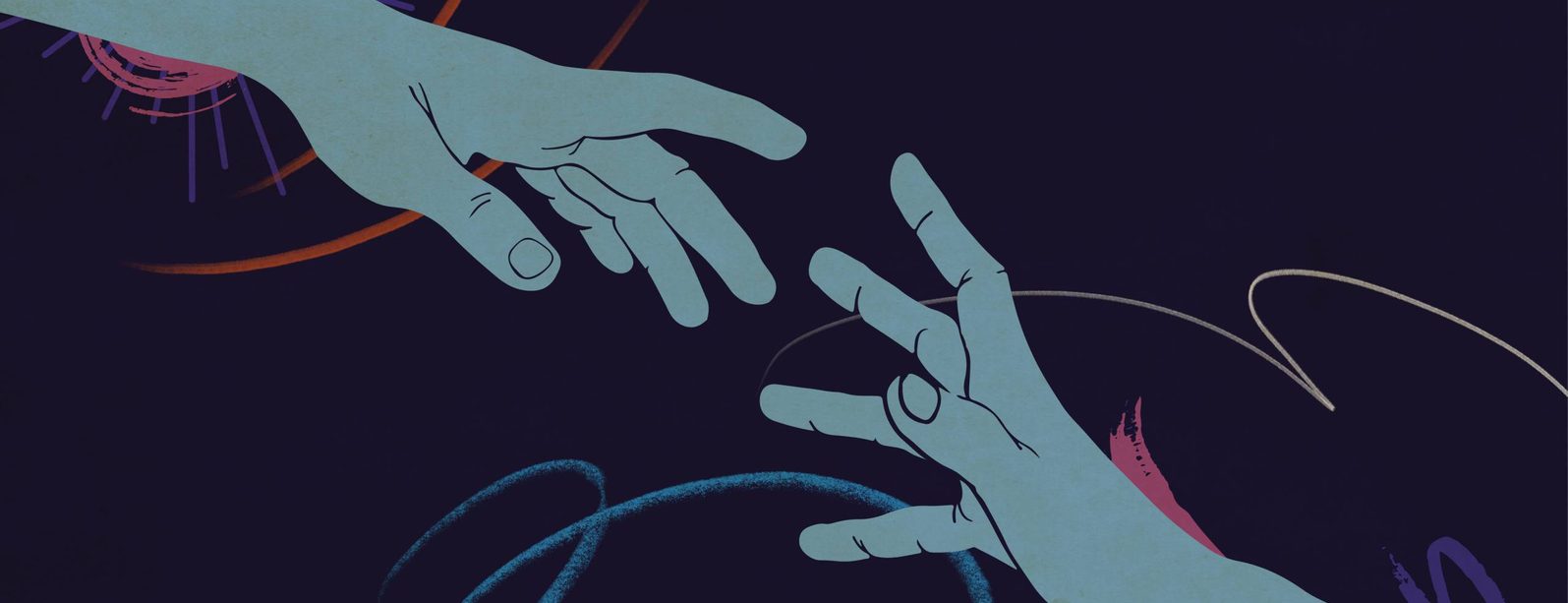
Bristol seemed to be like the centre of the classical musical world these last few days! We’ve had several features on BBC Radio 3 in the prominent Breakfast and In Tune slots and the Association of British Orchestras had their annual conference at the Bristol Beacon. As a result, representatives of all the major orchestras in the land were here along with many of the great and the good. On top of this, there were two outstanding concert performances, the World premiere of Jonathan Dove‘s Odyssey at the Beacon and a chamber recital at St George’s that really demonstrated the potential reach, influence and positivity of music.
Laura van der Heijden and Jâms Coleman at St Georges’s
On Friday I was in the front row to see Laura van der Heijden and Jâms Coleman perform a cello/piano recital. They both spoke eloquently and with humour about each of the works and struck up a real rapport with the audience. It was very down to earth and light hearted. At one point there was a bit of embarrassment for clapping in the wrong place but van der Heijden put the audience at ease and encouraged them to clap “if that’s what they felt inspired to do”. She said that she would love classical concerts to be like jazz performances where the audience could clap after a great solo. She said that “we’re not there yet though” and also warned that although she was in favour, not every classical artist is to her way of thinking, mentioning a stern desisting rebuke she had seen given by a flamboyant pianist in Italy.
I was attracted to this concert based on the programme featuring George Walker’s Cello Sonata and Three Pieces by Nadia Boulanger. In fact, the whole concert was like a sonata in itself, starting and finishing with romantic pieces by Schnittke and Franck with the rhythmic, spiky percussive gems in the middle.
The work of George Walker is intriguing to me. There are real similarities to Copland’s less well-known modernist works. His Cello Sonata combines jazz and blues with serialism and is like fusion food – it shouldn’t work, but it does. I feel a deep dive coming on! I already knew the Boulanger pieces – please check them out for yourself – you’ll realise that she could have been a master composer had she decided not to give it all up to be a full-time composition teacher.
Although I’m a real fan of Claude Debussy I hadn’t previously come across his cello sonata. For me, this piece is hard to resist with so much virtuosity and great plucked sounds. Considering, it was written in 1915 it initially sounds way ahead of its time. However, one has to remember that this was written just a couple of years after Stravinsky’s The Rite of Spring and all around him would have been the revolutionary art works by the Cubists Pablo Picasso and Georges Braque and the conceptual art Marcel Duchamp. On that basis it sits perfectly in the zeitgeist. You can certainly understand why so many budding artists, musicians and poets were attracted to Paris before and after the war – including of course the young Aaron Copland.
If you, like me are drawn to percussive sounds in Debussy’s sonata, I guarantee you 100% that you will love the music of current trend setters – Caroline Ward, Jessie Montgomerie and Missy Mazzoli.
The two performers had been on In Tune a couple of nights before to plug the concert and their new CD release. On leaving St George’s after a delightful Korngold encore, I heard a fellow concert goer say to his companion “Thank you Radio 3”. I couldn’t agree more.
World premiere of Jonathan Dove’s Odyssey
At the other end of the classical music spectrum was the World Premiere of Odyssey composed by Jonathan Dove with libretto by Alasdair Middleton. This took place on Sunday evening at 5pm at the recently revamped Bristol Beacon concert hall. This oratorio was performed by the Bournemouth Symphony Orchestra (David Ogden conducting), the City of Bristol Choir, Bristol Youth Choir, the Bristol Windrush Reggae Choir, tenor Thando Mjandana and soprano Francesca Chiejina.
I was particularly delighted for Thando Mjandana. The last time I saw him (back in October) he was performing for the Birmingham Contemporary Music Group to around 30 people at St George’s. It must have been really gratifying for him to have such a large Bristol audience this time out.
This was a very important piece for Bristol and the Beacon whose history is intricately linked with the shameful trans-Atlantic slave trade. Odyssey tells the story of a young man, known as “Him” who flees a war-torn African country and makes the long and treacherous journey to Europe in hope of refuge.
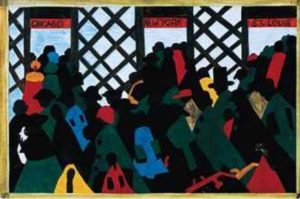
Jacob Lawrence: Panel 1 from Migration Series “During World War 1 there was a great migration north by Southern African Americans”. Museum of Modern Art, New York.
Throughout the 50-minute work there were many moving passages. Whenever the choir sang the word “Home” they would hold up pictures of hometowns from where refugees have travelled. In addition, during parts of the long journey the chorus swayed from side to side. It provided a very powerful image of the mass movement of people (putting me in mind of the Migration Series of pictures by Jacob Lawrence which I was lucky enough to see earlier this year at the Museum of Modern Art in New York).
In the libretto by Alasdair Middleton, there were many memorable lines that could not possibly fail to penetrate the listener to the core. The idyll of life where “the sun sets behind a jar of honey” is shattered by war where “At Noon they break the Children’s hands” and “At Sunset they torch the bodies in the square.”
There are numerous references to the clandestine world of people smuggling “My cousin has a friend who has an aunt who knows somebody Who could get you away” and frequent reminders that despite all the hardships that the refugees endure that there is only one possible choice – to go forward.
“Better to trust to the mercy of God Than the mercy of men”.
“There is nothing in front of us Worse Than what waits behind”.
“This Hell is better than the Hell we come from.”
And even when Him reaches “Europa the possible” the simple desire for “White sheets and the smell of bread in the oven” is so far from the dehumanising and demoralising reality.
Shunted Shifted Shoved Denied
Pushed about Penned in
Doubted Dismissed
Probed Processed
Rejections
Refusals”
It was nothing short of a triumph and it got the audience reaction that it deserved. Let’s not forget that this was completely new music. Not something composed 200 years ago but a work hot off the press. It just goes to show that it is possible to put bums on seats and get standing ovations from a new composition that deals with a difficult subject matter.
We need to fund new music and collaborations like this – big and bold creations that are relevant to here and now. It certainly brought to mind the music that Aaron Copland composed in the 1930s and 40s. Works that were created specifically for high school or up and coming performers or designed to educate and inform or to celebrate the nobility of ordinary people. He described this as Music for Use – it was very much a part of Roosevelt’s New Deal optimism that aimed to bring arts to the masses. It’s just as important now as it was back then.
The performance of Odyssey was part of Be Kind Bristol “a celebration of the of the lives and creativity that people who seek sanctuary bring to Bristol”. The first part of the concert was devoted to a song created and performed by young students from the City Academy and May Park Primary School and some rap tunes led by rappers MoYah (himself a refugee originally from Mozambique) and Don Jaga.
What a great idea putting together rap and classical music! Thereby introducing older folks to younger sounds and Gen Zs to classical music. We often hear about efforts to get younger audiences to classical music – this sort of thing could work.
I am quite certain that this performance will have changed lives for more than a few of the children either involved on the stage and in the chorus or enthralled in the audience.
However, one has to remember that it’s just as important for older people to get out of their comfort zone and listen to something unusual as well. I think you’d have to be pretty curmudgeonly not to have got a kick out of the kids performing but hopefully the impact will go deeper than that and persuade more regular concert goers to open their ears, broaden their horizons and consider every day a school day!
The more things change……
I am of course hopeful that this is the first of many projects like this. However, I must admit that I am more than a little bit worried. Everyone I talk to in the arts is concerned about funding. The Beacon itself is in a difficult place as a result of the huge cost of the renovation (£131.9 million) due to Covid, the Ukraine war, global material shortages and rising inflation. It’s heart breaking that even though we now have such an amazing space that squeezed budgets might make more fantastic events like this less likely to reach the stage.
I might be wrong but unfortunately, aside from the welcome residency of the Para-Orchestra, the schedule for the remainder of the classical season seems to be illustrative of this and does suggest that the Beacon is cutting its cloth accordingly and being forced to back sure winners. I would have loved to have seen a more adventurous programme. For sure, there are some things that appeal to me – works by Roy Harris, John Adams and Wynton Marsalis but overall it does look like the sort of offer that will guarantee a big audience – famous orchestras playing popular works by big name, male, white composers. This does stand out like a sore thumb I’m afraid – the composers represented are 100% male, 97% white and 86% European and furthermore 89% of works are from pre-1950.
Considering, all the great things about this weekend’s concerts and how far we’ve come on diversity, equality and inclusivity, it’s a bit of a depressing note to end on.
More info:
You can read the whole libretto to Odyssey here.
I went to see Odyssey with my Mum. She also writes a blog www.bristolhistory.co.uk which is all about the interesting stories of ordinary people past and present. Her blogs strapline is Bristol History from rom below the salt. The unfamous, the infamous, the heroic. We were both moved by Odyssey. She has also written a review which can be viewed here.

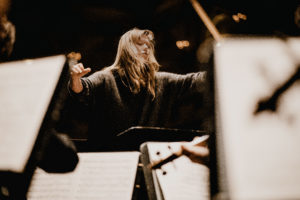
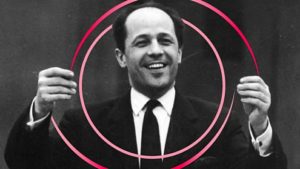
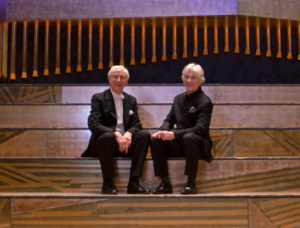





Blog Comments
Jonathan Dove
4th March 2024 at 8:47 am
Thank you so much for your enthusiastic and sympathetic review of Odyssey. It was a profoundly rewarding experience, and I would love there to be further performances, so I am grateful for your advocacy.